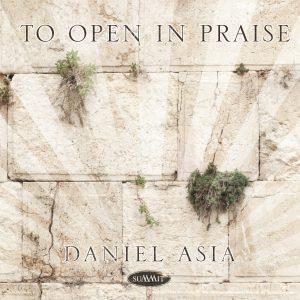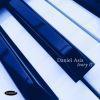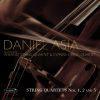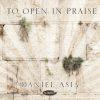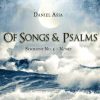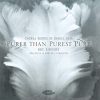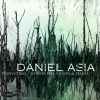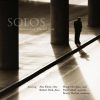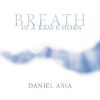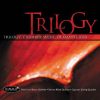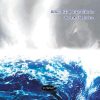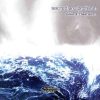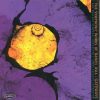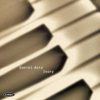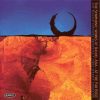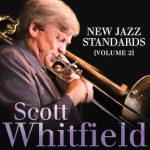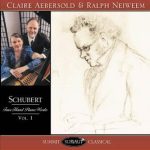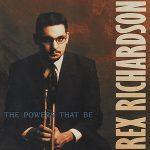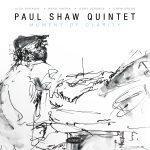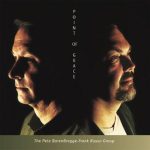To Open in Praise – Daniel Asia
From the Composer:
The three works on this CD were written over a twenty-five year period. They look at the human experience through Jewish texts: a Jewish sacred text, and the poems of a New York Jewish poet and an Israeli Jewish poet. This is to say that we all have prisms through which we mediate our understanding of the world and our place in it. In the beginning God spoke the world into being, and we humans continue to formulate the world through our verbalization of it. Musicians do this through that articulation of sound which compliments words, gives them depth, and color. In the compositions presented here, words and music unite to let us feel, which is necessary before rationalization and words take over, and to present a multiplicity of understandings through their interaction. Intuition, that often inchoate stream of possibility, drives composers and poets to find their own place in the universe of music and poetic image. The process suggests more questions than answers, and so the next musical composition or poem. These pieces aim for a sense of honesty in that regard, of who we are, how we live, and evokes the incipient Meaning that underlies human existence. Finally then, the work presented here aspires to connect us to the mystery of our own ongoing, through which we reach for that which is beyond our grasp, and in doing so requires us to open in praise.
Psalm 30, a song for the dedication of the house, is about transformation from fear and trepidation to one of belief in the powers and wonder of God. The concluding lines are “Thou hast changed my mourning into dancing; thou hast put off my sackcloth and girded me with joy; so that my soul may praise thee, and not be silent. Lord, I will thank thee forever.” The music combines a somewhat mournful quality with more dance-like material (particularly in the violin solo), and also includes a melody that more than hints at its joyful chassidic roots. The work ends without a complete resolution, but instead with a drifting off, as all sound fades into the infinity of forever, of questions unanswered.
Psalm 30 was written for Jack Chomsky, baritone, and first performed by him, Daniel Heifetz, violin, and J. Randal Hawkins, piano on April 13, 1986. It was commissioned by Marilyn and Lee Skilken in memory of Marilyn’s father, Samuel Mintzes, Congregation Tifereth Israel, Columbus, Ohio, and is dedicated to Cantor Jack Chomsky.
The poems of Breath in a Ram’s Horn range from the sublime to the mundane, from the sacred to the profane. The texts are by Paul Pines, who I met at the MacDowell Colony, an artist’s retreat in Peterborough, New Hampshire. We became close friends, partly as the result of a shared ferocity brought to the game of table tennis. I requested books of poetry, fell in love with his work, and have since written many compositions based on his writings.
His poems bring together disparate worlds, uniting a wealth of emotional perspectives. The imagery ranges from Ecclesiastes to the Blues, stating something universal that is culled from the simple and earthy. At the core of the work is man’s uneasy place in the universe; that of a curious bystander to his own inner world, living in a physical world he also hardly understands. How these interior and exterior worlds meet and interact is the enigma at the center of these poems; an enigma that is imbued with a wry and delicate sense of humor.
The poems in this cycle provide images of family and Judaism, and their intertwining. There are memories of father, mother, and grandfather; memories of prayer shawls, phylacteries, praying; imagery of the high holydays, Rosh Hashana and Yom Kippur; the power of recollection; and a reflection on Job and David. And just like the lives of these two Biblical characters, the poems are not pretty or easy, but rather filled with the difficulties and anguish of a life as it is really lived.
Amichai Songs is comprised of poetry by the Israeli poet Yehuda Amichai, Israel’s most prominent modern poet. The texts present an intriguing view of the modern Jewish Israeli experience. Amichai unwraps and unravels the relationship between the people of Israel, the Jews, the Situation (Israel’s place in the Middle East, in all of its ramifications), the individual living in these circumstances, and his relationship to God and the natural world. Included are discussions of God’s presence, slaughtered chickens, Auschwitz, the nature of life in Jerusalem/Israel, universal riddles, soldiering, and the natural world.
Amichai Songs was commissioned by SOLI (San Antonio, TX), and New Music Network (Philadelphia, PA) and first performed by them in 2013.
In all these works I provide music that supports the texts and gives them my own curious and idiosyncratic readings. This means that the musical language is quite wide and inclusive, and is always used to bring a deeper meaning and understanding to the texts. The music is Jewish in that I am Jewish, in the same way that Bach’s textual works are Christian as he was a Lutheran. But it is of course universal in the manner that all fine music is just that- God willing.
REVIEW from FANFARE:
ASIA Psalm 30 1 . Breath in a Ram’s Horn 2 . Amichai Songs 3 • 2,3 Odaline de la Martinez, cond; 2 Robert Swensen (ten); 1,3 Jeremy Huw Willams (bar); 1 Ellen Chamberlain (vn); 1 Paula Fan (pn); 2,3 Lontano • SUMMIT 703 (39:14)
My colleague David Wollman interviewed Daniel Asia in Fanfare 34:2, centering his questions around Asia’s then-new choral release, Purer than Purest Pure, also on the Summit label. Asia’s music is immediately approachable, yet this approachability cloaks myriad subtleties. The present disc presents vocal music written over a 25-year period. The thread is Jewish texts in three “flavors”: a sacred text (a Psalm), a New York Jewish poet, and an Israeli Jewish poet. Asia’s stated aim is to “aim for a sense of honesty” regarding “who we are, how we live” and to seek to evoke the “incipient Meaning that underlies human existence.” To connect to mystery beyond us, Asia suggests that we are required “to open in praise,” hence the title of the disc.
The setting of Psalm 30 (“a song for dedicating the House of David”; other sources call it “a song for the dedication of the Temple,” both being translations of the first phrase, “mizmor shir Hanukkat ha-bayit”) features the sweet violin of Ellen Chamberlain; the instrumental voice is an integral part of the musical argument as well as the atmosphere of the poem. There is a yearning lyricism to the music here, the shadow of which lies over the long, technically difficult dancing passage for violin and piano alone. Repeated listening reveals subtleties of both phrase construction and in the delivery thereof; pianist Paula Fan has a fabulously light touch when required and Chamberlain shapes the music beautifully. Baritone Jeremy Huw Williams, a student of April Cantelo who specializes in contemporary music, sings with full tone, even in the quieter, unaccompanied passages.
The poetry of Paul Pines, a poet whom Asia met at the MacDowell Colony, furnishes the texts for Breath in a Ram’s Horn. This is astonishingly powerful writing. Lines such as “died young and / left me behind like / a clue / at the scene / of a crime” resonate long in the reader’s (and listener’s) psyche. The expressive, strong, and flexible tenor voice of Robert Swensen is joined by the experienced musicians of Lontano under Odaline de la Martinez. If there is one connecting factor between the very varied texts chosen here, it is the nexus between inner and outer worlds. Judaic imagery here seems a thread pulled and extended from Psalm 30. This is not the only recording of Breath in a Ram’s Horn; the other is with piano on a Summit DVD reviewed by Paul Ingram in Fanfare 28:2. The use of instrumental ensemble here means there is a rich and wide palette derived from the scoring of flute, clarinet, violin, cello, and piano. Some of the writing is reminiscent of Britten (the ending of the second poem at the words “swaying / as he prays / to a strange god / in a strange tongue”); some of the gestures recall Walton. The vital energy of the accompaniment for “Job longed for the grave” is beautifully realized, as is the lazy swing to “My father’s name was.”
Setting poetry of the prominent Israeli poet Yehuda Amichai, the final group of songs sets out to examine the relationship between Israel, Judaism, the Middle East, and the individual’s relationship to Deity and the surrounding world. God, chickens, and Auschwitz are all part of the wide word palette of this poetry; Asia reflects the serious nature of the subject matter with infinite care and, often, tenderness. The most angular music of the disc occurs in the setting of “Jerusalem,” balanced by the deft lightness of “Through two points only (Theorem in geometry).” The breathless urgency of the instrumental opening to the final movement, “A young soldier; Like torn shirts; In the right angle (Three Quatrains),” introduces music that shifts mood, and with it the listener’s emotions, effortlessly. The arrival of the quiet, static “Like torn shirts,” the central quatrain, is beautifully managed. Jeremy Huw Williams is once more the most eloquent of interpreters.
This is a remarkable disc, thought-provoking and important in the subject matter it addresses. The recordings (made in Tucson and London) are brilliantly done.
-Colin Clarke for Fanfare
Daniel Asia (b. 1953, Seattle, WA) is one of a small number of composers who have traversed both the realms of professional performance and academia with equal skill. As testament to this he is a 2010 recipient of a major American Academy of Arts and Letters award. Elliott Hurwitt writes in a Schwann Opus review of the composer’s music, “Daniel Asia is a genuine creative spirit, an excellent composer… He is a welcome addition to the roster of our strongest group of living composers.” Asia is recognized as one of THE composers of this new classical music era.
The three works on this CD were written over a twenty-five year period. They look at the human experience through Jewish texts: a Jewish sacred text, and the poems of a New York Jewish poet and an Israeli Jewish poet. This is to say that we all have prisms through which we mediate our understanding of the world and our place in it. In the beginning God spoke the world into being, and we humans continue to formulate the world through our verbalization of it. Musicians do this through that articulation of sound which compliments words, gives them depth, and color. In the compositions presented here, words and music unite to let us feel…
These pieces aim for a sense of honesty in that regard, of who we are, how we live, and evokes the incipient Meaning that underlies human existence.
Psalm 30, a song for the dedication of the house, is about transformation from fear and trepidation to one of belief in the powers and wonder of God. Psalm 30 was written for Jack Chomsky, baritone, and first performed by him, Daniel Heifetz, violin, and J. Randal Hawkins, piano on April 13, 1986.
The poems of Breath in a Ram’s Horn range from the sublime to the mundane, from the sacred to the profane. The texts are by Paul Pines.
Amichai Songs is comprised of poetry by the Israeli poet Yehuda Amichai, Israel’s most prominent modern poet. The texts present an intriguing view of the modern Jewish Israeli experience.



